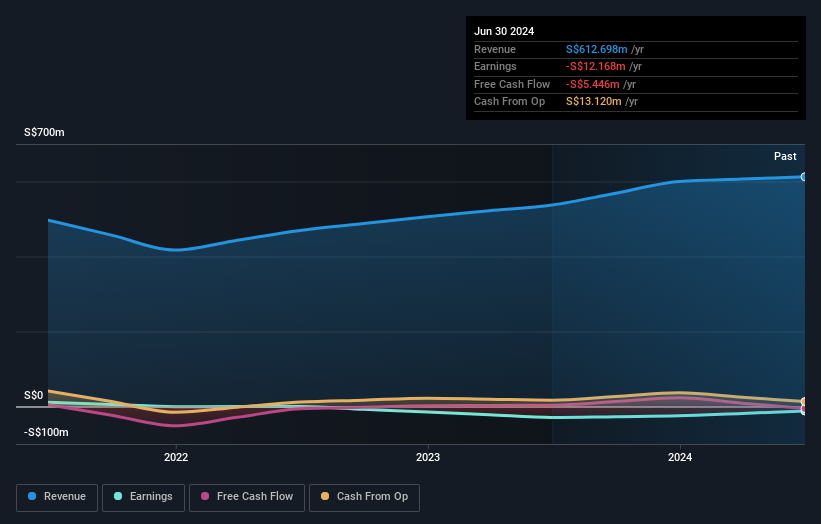- Singapore
- /
- Specialty Stores
- /
- SGX:A30
Private companies invested in Aspial Corporation Limited (SGX:A30) copped the brunt of last week's S$18m market cap decline

Key Insights
- Aspial's significant private companies ownership suggests that the key decisions are influenced by shareholders from the larger public
- The largest shareholder of the company is MLHS Holdings Pte Ltd. with a 54% stake
- Insiders own 34% of Aspial
To get a sense of who is truly in control of Aspial Corporation Limited (SGX:A30), it is important to understand the ownership structure of the business. The group holding the most number of shares in the company, around 54% to be precise, is private companies. That is, the group stands to benefit the most if the stock rises (or lose the most if there is a downturn).
Following a 11% decrease in the stock price last week, private companies suffered the most losses, but insiders who own 34% stock also took a hit.
Let's delve deeper into each type of owner of Aspial, beginning with the chart below.
Check out our latest analysis for Aspial

What Does The Lack Of Institutional Ownership Tell Us About Aspial?
Small companies that are not very actively traded often lack institutional investors, but it's less common to see large companies without them.
There are many reasons why a company might not have any institutions on the share registry. It may be hard for institutions to buy large amounts of shares, if liquidity (the amount of shares traded each day) is low. If the company has not needed to raise capital, institutions might lack the opportunity to build a position. It is also possible that fund managers don't own the stock because they aren't convinced it will perform well. Institutional investors may not find the historic growth of the business impressive, or there might be other factors at play. You can see the past revenue performance of Aspial, for yourself, below.

Hedge funds don't have many shares in Aspial. The company's largest shareholder is MLHS Holdings Pte Ltd., with ownership of 54%. This essentially means that they have extensive influence, if not outright control, over the future of the corporation. In comparison, the second and third largest shareholders hold about 19% and 4.9% of the stock. Wee Seng Koh, who is the second-largest shareholder, also happens to hold the title of Chief Executive Officer.
Researching institutional ownership is a good way to gauge and filter a stock's expected performance. The same can be achieved by studying analyst sentiments. We're not picking up on any analyst coverage of the stock at the moment, so the company is unlikely to be widely held.
Insider Ownership Of Aspial
The definition of an insider can differ slightly between different countries, but members of the board of directors always count. The company management answer to the board and the latter should represent the interests of shareholders. Notably, sometimes top-level managers are on the board themselves.
I generally consider insider ownership to be a good thing. However, on some occasions it makes it more difficult for other shareholders to hold the board accountable for decisions.
Our information suggests that insiders maintain a significant holding in Aspial Corporation Limited. It has a market capitalization of just S$138m, and insiders have S$46m worth of shares in their own names. It is great to see insiders so invested in the business. It might be worth checking if those insiders have been buying recently.
General Public Ownership
The general public, who are usually individual investors, hold a 12% stake in Aspial. While this group can't necessarily call the shots, it can certainly have a real influence on how the company is run.
Private Company Ownership
It seems that Private Companies own 54%, of the Aspial stock. It's hard to draw any conclusions from this fact alone, so its worth looking into who owns those private companies. Sometimes insiders or other related parties have an interest in shares in a public company through a separate private company.
Next Steps:
While it is well worth considering the different groups that own a company, there are other factors that are even more important. For instance, we've identified 3 warning signs for Aspial (2 don't sit too well with us) that you should be aware of.
If you would prefer check out another company -- one with potentially superior financials -- then do not miss this free list of interesting companies, backed by strong financial data.
NB: Figures in this article are calculated using data from the last twelve months, which refer to the 12-month period ending on the last date of the month the financial statement is dated. This may not be consistent with full year annual report figures.
New: Manage All Your Stock Portfolios in One Place
We've created the ultimate portfolio companion for stock investors, and it's free.
• Connect an unlimited number of Portfolios and see your total in one currency
• Be alerted to new Warning Signs or Risks via email or mobile
• Track the Fair Value of your stocks
Have feedback on this article? Concerned about the content? Get in touch with us directly. Alternatively, email editorial-team (at) simplywallst.com.
This article by Simply Wall St is general in nature. We provide commentary based on historical data and analyst forecasts only using an unbiased methodology and our articles are not intended to be financial advice. It does not constitute a recommendation to buy or sell any stock, and does not take account of your objectives, or your financial situation. We aim to bring you long-term focused analysis driven by fundamental data. Note that our analysis may not factor in the latest price-sensitive company announcements or qualitative material. Simply Wall St has no position in any stocks mentioned.
About SGX:A30
Aspial
An investment holding company, operates in the real estate, financial service, and jewelry businesses in Singapore, Australia, Malaysia, Greater China, and Europe.
Mediocre balance sheet low.


